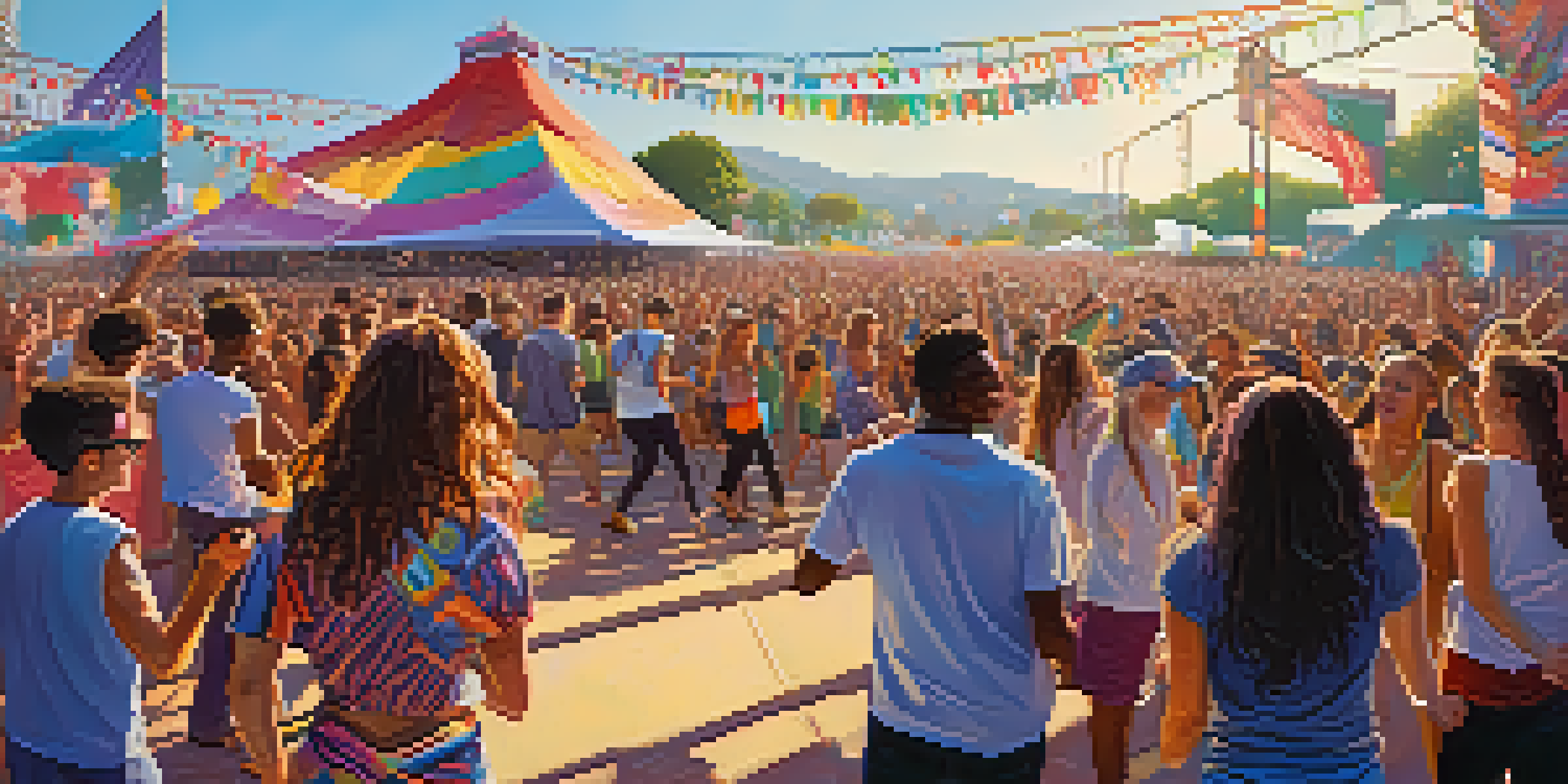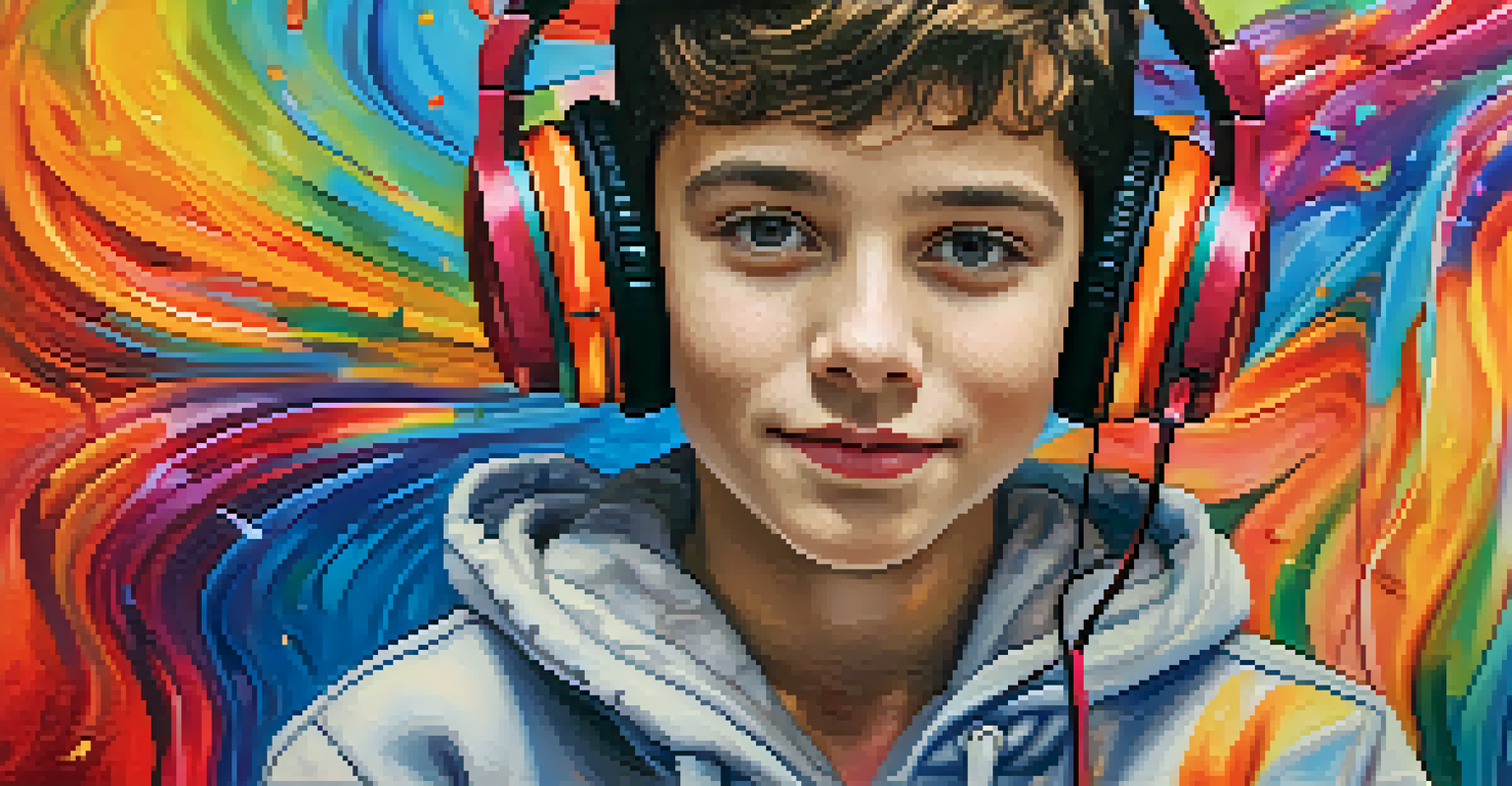How Music Influences Youth Culture and Community Dynamics

Music as a Form of Identity for Youth
For many young people, music serves as a crucial part of their identity. It’s not just about listening; it's about how they express themselves and connect with others. From fashion choices inspired by favorite artists to the lyrics that resonate with their experiences, music helps define who they are.
Music can change the world because it can change people.
Different genres often align with specific subcultures, creating a sense of belonging among fans. For instance, punk rock may attract those who value rebellion, while hip-hop often reflects resilience and storytelling. This connection between music and identity shapes not only personal choices but also group dynamics.
Ultimately, the music youth choose becomes a soundtrack to their lives, influencing their attitudes, behaviors, and even their aspirations. When young people gather for concerts or music festivals, they are not just enjoying the tunes; they are partaking in a shared experience that reinforces their identity.
The Role of Music in Social Movements
Music has long been a powerful tool for social change, especially among youth. From protest songs of the 1960s to contemporary anthems advocating for climate action, music rallies people around a cause. This ability to inspire action makes it a vital part of youth-led movements.

When young people resonate with a particular song, it can ignite a passion for activism and social justice. For instance, the rise of hip-hop has often highlighted issues like racial inequality, encouraging listeners to engage in community discussions and actions. In this way, music becomes a catalyst for change.
Music Shapes Youth Identity
For many young people, music is not just entertainment but a vital part of their identity, influencing their self-expression and connections with others.
Moreover, songs often serve as a unifying force, bringing together diverse individuals to work towards a common goal. By singing along to shared anthems, youth can strengthen their resolve and create a sense of community that transcends individual differences.
How Music Shapes Community and Belonging
Communities often bond over shared musical tastes, creating a sense of belonging among residents. Local music scenes—whether they are hip-hop, indie, or folk—offer spaces for youth to connect and collaborate. This shared love for music can lead to friendships and networks that extend beyond the music itself.
Where words fail, music speaks.
Music festivals and concerts act as social hubs where diverse groups gather, fostering interaction and understanding. For example, a local band playing at a neighborhood park can bring together people from different backgrounds, sparking conversations that may not have happened otherwise. Such events help to break down social barriers.
Furthermore, music can reflect the values and challenges of a community, giving a voice to its residents. When local artists sing about their experiences, they create a narrative that resonates within the community, strengthening ties and encouraging collective action.
The Influence of Technology on Music Consumption
In today’s digital age, technology has transformed how youth discover and engage with music. Streaming platforms like Spotify and Apple Music have made it easier than ever for young listeners to explore diverse genres and artists. This accessibility encourages an open-minded approach to music consumption.
Social media also plays a significant role in promoting music and connecting fans. Platforms like TikTok have turned songs into viral sensations, influencing what youth listen to and share with their peers. This phenomenon not only boosts artists' visibility but also creates a culture of sharing and discovery among fans.
Music Fuels Social Change
Music has historically served as a powerful catalyst for social movements, inspiring youth to engage in activism and advocate for social justice.
However, the downside of this convenience is the potential for music to become disposable. With endless playlists and algorithms curating our listening experiences, some may argue that the emotional connection to music can diminish. Striking a balance between accessibility and meaningful engagement is essential for fostering a lasting appreciation for music.
How Lyrics Reflect Youth Experiences
Lyrics often serve as a mirror reflecting the experiences and emotions of youth. Many young listeners find solace in songs that articulate their struggles, triumphs, and aspirations. This connection between lyrics and life experiences can be comforting, validating feelings that might otherwise go unspoken.
For instance, songs addressing mental health issues or relationship challenges resonate deeply with many young people. Artists like Billie Eilish and Logic have crafted lyrics that discuss these topics candidly, encouraging open conversations. When youth relate to these messages, they feel less alone in their struggles.
Moreover, lyrics can inspire youth to envision a better future. Songs that explore themes of hope and resilience motivate listeners to push through challenges and strive for their dreams. In this way, music not only reflects reality but also shapes how young people perceive their own lives.
The Globalization of Music and Cultural Exchange
The globalization of music has opened doors for youth to engage with cultures beyond their own. With access to a variety of genres from around the world—such as K-pop, Afrobeat, or Reggaeton—young listeners can appreciate and celebrate cultural diversity. This exchange enriches their musical experiences and broadens their perspectives.
Collaborations between artists from different backgrounds showcase the beauty of cultural fusion. For example, the collaboration between American pop stars and Latin artists has led to mainstream hits that blend distinct musical styles. These partnerships not only highlight the power of music to transcend borders but also foster understanding among youth from different cultures.
Globalization Enhances Musical Diversity
The globalization of music allows youth to explore and appreciate a wide range of cultural influences, fostering a sense of global citizenship and interconnectedness.
As youth embrace global sounds, they may also adopt elements from various cultures into their own identities. This blending of musical influences encourages a sense of global citizenship, where young people recognize their interconnectedness and the shared experiences that unite them.
The Future of Music's Influence on Youth Culture
Looking ahead, music will continue to play a pivotal role in shaping youth culture and community dynamics. As societal issues evolve, so too will the themes explored in music, reflecting the changing landscape of youth experiences. Artists will likely address new challenges, providing a soundtrack for future generations.
Moreover, the rise of artificial intelligence and virtual reality may further revolutionize how youth interact with music. Imagine immersive concerts or personalized music experiences that adapt to individual preferences. These innovations could enhance the connection between music and identity, making it more relevant than ever.

Ultimately, the essence of music as a unifying force will remain intact. Whether through live performances, digital platforms, or collaborative projects, the power of music to inspire, connect, and empower youth will continue to resonate, shaping communities for years to come.